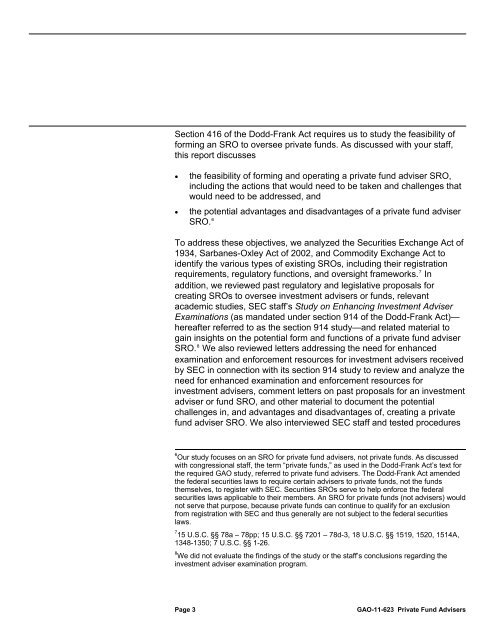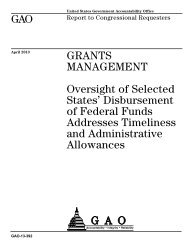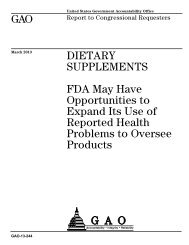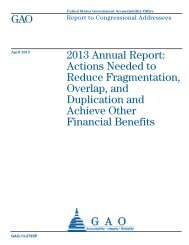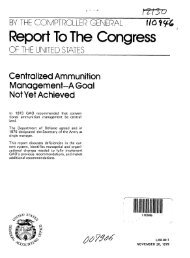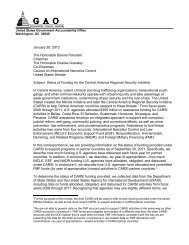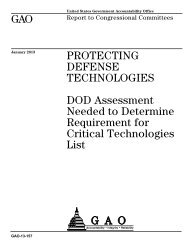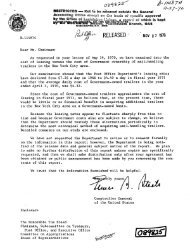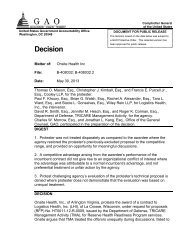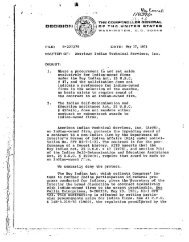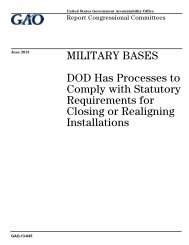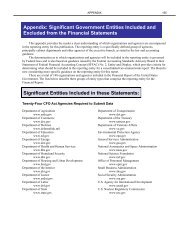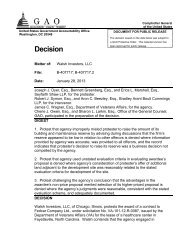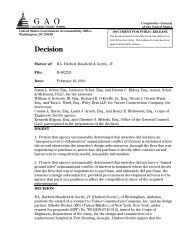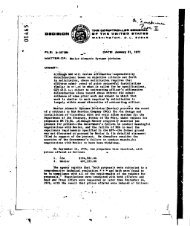GAO-11-623 Private Fund Advisers: Although a Self-Regulatory ...
GAO-11-623 Private Fund Advisers: Although a Self-Regulatory ...
GAO-11-623 Private Fund Advisers: Although a Self-Regulatory ...
Create successful ePaper yourself
Turn your PDF publications into a flip-book with our unique Google optimized e-Paper software.
Section 416 of the Dodd-Frank Act requires us to study the feasibility of<br />
forming an SRO to oversee private funds. As discussed with your staff,<br />
this report discusses<br />
<br />
<br />
the feasibility of forming and operating a private fund adviser SRO,<br />
including the actions that would need to be taken and challenges that<br />
would need to be addressed, and<br />
the potential advantages and disadvantages of a private fund adviser<br />
SRO. 6<br />
To address these objectives, we analyzed the Securities Exchange Act of<br />
1934, Sarbanes-Oxley Act of 2002, and Commodity Exchange Act to<br />
identify the various types of existing SROs, including their registration<br />
requirements, regulatory functions, and oversight frameworks. 7 In<br />
addition, we reviewed past regulatory and legislative proposals for<br />
creating SROs to oversee investment advisers or funds, relevant<br />
academic studies, SEC staff’s Study on Enhancing Investment Adviser<br />
Examinations (as mandated under section 914 of the Dodd-Frank Act)—<br />
hereafter referred to as the section 914 study—and related material to<br />
gain insights on the potential form and functions of a private fund adviser<br />
SRO. 8 We also reviewed letters addressing the need for enhanced<br />
examination and enforcement resources for investment advisers received<br />
by SEC in connection with its section 914 study to review and analyze the<br />
need for enhanced examination and enforcement resources for<br />
investment advisers, comment letters on past proposals for an investment<br />
adviser or fund SRO, and other material to document the potential<br />
challenges in, and advantages and disadvantages of, creating a private<br />
fund adviser SRO. We also interviewed SEC staff and tested procedures<br />
6<br />
Our study focuses on an SRO for private fund advisers, not private funds. As discussed<br />
with congressional staff, the term “private funds,” as used in the Dodd-Frank Act’s text for<br />
the required <strong>GAO</strong> study, referred to private fund advisers. The Dodd-Frank Act amended<br />
the federal securities laws to require certain advisers to private funds, not the funds<br />
themselves, to register with SEC. Securities SROs serve to help enforce the federal<br />
securities laws applicable to their members. An SRO for private funds (not advisers) would<br />
not serve that purpose, because private funds can continue to qualify for an exclusion<br />
from registration with SEC and thus generally are not subject to the federal securities<br />
laws.<br />
7<br />
15 U.S.C. §§ 78a – 78pp; 15 U.S.C. §§ 7201 – 78d-3, 18 U.S.C. §§ 1519, 1520, 1514A,<br />
1348-1350; 7 U.S.C. §§ 1-26.<br />
8<br />
We did not evaluate the findings of the study or the staff’s conclusions regarding the<br />
investment adviser examination program.<br />
Page 3<br />
<strong>GAO</strong>-<strong>11</strong>-<strong>623</strong> <strong>Private</strong> <strong>Fund</strong> <strong>Advisers</strong>


